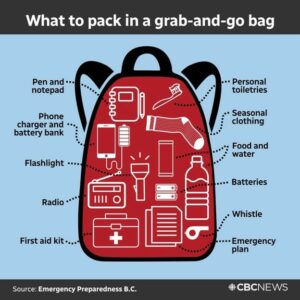B.C. residents are advised to keep ‘go bags’ ready as wildfire season is still upon us. Some of the items included in a suggested emergency kit on the province’s emergency preparedness website include:
- Cash in small bills
- A copy of your emergency plan and copies of important documents, such as insurance papers
- A first-aid kit and medications
- Non-perishable food and four litres of water per person per day
- A phone charger

Create an emergency preparedness plan
Regional districts in B.C. and the province also maintain websites with information about preparing for an evacuation and the things you may need or need to think about.
Creating an emergency plan with family and friends or for yourself if you live alone, will help you be prepared should a disaster, crisis, or other emergency strike.
Strategies for yourself or with members of your household
Consider the types of disasters that may happen from a fire to severe weather to earthquakes and other events. If you live with others, talk as a group about why it’s important to prepare for a disaster. Explain that developing an emergency plan is one way to take positive action toward being better prepared. Here are some tips:
Set up a buddy system. This will allow each person in a pair to help protect the other. If you live alone, identify a buddy or someone you would be in touch with immediately in an emergency.
Post emergency telephone numbers (fire, police, ambulance, etc.) by phones.
Ensure that mobile phones are set to receive emergency alerts. If you need help with these settings, contact your mobile phone carrier.
Discuss with everyone living in your home what to do in an evacuation. Plan how to take care of pets and each other.
Ask an out-of-town relative or friend to be your family’s emergency contact. You and your family can call this person and explain where you each are. Then, if you get separated, the contact can tell each of you where the others are and where you can all meet. Also, find out if your friend or relative could house you and your family if you had to evacuate, and offer to return the favour if it’s ever needed.
Talk about how to keep in touch in a crisis. The Red Cross suggests making phone calls during off-peak hours or sending text or email messages if calls do not go through. You might talk about how to tell others you’re safe if you became separated in a crisis on such sites as Facebook.
Leave at least half a tank of fuel in each car at all times. If you need to leave home fast, you won’t have to worry about where to get fuel.
Plan how you’d care for pets. If your emergency plan involves pets, make sure you have a crate or other carrier, enough pet food and water, and a copy of your pet’s vaccinations. Confirm that your meeting place or evacuation location will allow pets.
Talk with your neighbours about helping each other in an emergency. You may be able to work out a mutual plan to help care for each other’s pets or property.
Include your older relatives in your emergency plan. Whether they live at home or with you, they may face many challenges that put them at a higher risk for illness or injury in a crisis. Help your older relative stay safe in an emergency by learning about the types of crises that might occur and include them in planning for how to respond according to their current functioning.

Tips for children
When talking with a child, use age-appropriate language. Explain that having a plan makes it more likely that the family will stay together in an emergency.
Teach very young children their last names and the name of their city or town. If they get separated from your family in a crisis, this knowledge will help you and your children find each other.
Make sure everyone knows family mobile phone numbers. Enter the numbers into the contact lists on your children’s phones. Or post them in a note on the home screen.
Teach children how and when to call for help. Explain how to call 9-1-1 and leave a sample script by each phone.
Show children (and any adults needing instruction) how to send text messages from their phones. Explain that phone calls may not go through in an emergency, when lines are very busy, but that text messages may get through even if you can’t complete a phone call.
Source: Telus Health, Heartbeat newsletter
Resources:
Wildfire emergency updates – Alberta